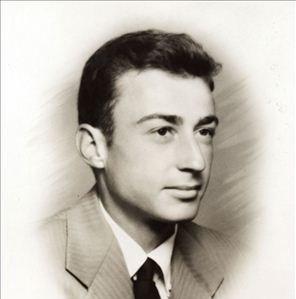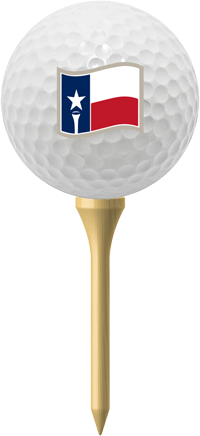Class of 1997
Morris Williams, Jr.
Amateur Player

This exhibit is just getting started...
We are currently updating our inductee exhibits and capturing their stories in our ongoing archival and preservation efforts.

Biography
Sometimes it's easy to forget Morris Williams Jr. He never won any big name golf tournaments. No U.S. Amateurs, Masters wins or Ryder Cups to speak of. But Morris Williams, Jr., was one of the best young golfers in the history of the state.
The story begins at 517 E. 40th St., about a mile and a half from the UT campus. It used to be the Williams House. Back in the 1930's a sportswriter for The Austin-American Statesman named Morris Williams Sr. lived there with his wife and only son, Junior.
Several years before, Statesman editor Charlie Green had barged into the sports office demanding a writer for the golf beat, not caring if he knew bogey from par. The senior Williams was his man; he figured that he'd cover the sport for about a week. He ended up as one of the premier golf writers in the state during his 33-year career with the Statesman.
Incidentally, the house on 40th Street was, and is, right next to a golf course. Today that course is a nine-hole track known as Hancock Municipal. But back in the '30s, it was a full 18 holes and was the home of Austin Country Club. The senior Williams became a member at the club and set about learning the game that would dominate his vocation. He brought his son along.
Almost as soon as he picked up a golf club, members noticed Williams Jr.'s knack for the game.
The lean, handsome boy with the curly hair developed a repeatable, upright swing that made the ball dance. He hardly ever missed a fairway. With a wedge or a 9-iron, he was downright diabolical.
It was obvious that when it came time for him to go to college, he would choose Texas. He had grown up a brisk five-minute walk from campus, a childhood serenaded by the bells of the Tower's carillon.
And then there was Harvey Penick. A friend of the Williams family, Penick had been the head pro at Austin Country Club since 1923, and coached the University of Texas golf team from 1931-1963. Late in life he would gain fame as the writer of The Little Red Book, one of the best-selling golf instruction guides of all time. He was perhaps the greatest teacher of the game who ever lived. Williams Jr. was born to play for Mr. Penick. "Morris was grinning and friendly, almost apologetic about beating you," Penick wrote in his book, "And if You Play Golf, You're My Friend." Junior fit right in on the 40 Acres and immediately set out winning tournaments. As the team's No. 1 player, he helped the Longhorns to conference championships in 1948, '49 and '50.
The 1950 Southwest Conference Championship was highlighted by one of William's most famous moments. At Colonial Country Club in Fort Worth, widely considered the best and hardest course in Texas, he was in a deciding match against Texas Christian University's No. 1 player, Dan Jenkins, who would later become one of the most famous golf writers in America. Williams had never seen Colonial before, and to increase the pressure, nine-time major winner Ben Hogan had shown up to watch the match.
At the par-four seventh hole, with two holes to play, Jenkins hit an approach shot out of the rough, over some trees, landing six inches from the hole. Jenkins looked poised to take the lead and the match - that is, at least until Williams holed out with his second shot from over 100 yards for an eagle. Jenkins three-putted the next hole, and the match was over.
It was a defining moment in a career full of achievement. Perhaps his greatest as a golfer was his fabled "Texas Slam." In a 12-month stretch spanning 1949-1950, Williams won the Texas Junior golf title, the Texas Amateur and the Texas PGA's annual tournament. No one else in history has ever won the top junior, amateur and professional tournaments in Texas all in one year. In that same period, Williams came within a hair of winning the NCAA individual championship, losing 1-down in the 36-hole final to Harvie Ward, one of the best amateur golfers in history. A proud father, Williams Sr. and his wife had collected two huge scrapbooks full of clippings and pictures of their son's exploits. It looked like the younger Williams was about to make a name for himself on the PGA Tour.
But it was not to be.
The life of a touring pro was much different back in the early '50s. It was a struggle to survive. Only the top golfers lived comfortably. Surely Williams would one day be one of the big shots, but he had to start somewhere. The Korean War was in full swing, so after graduation he joined the Air Force to save up some money for the tour.
He still played golf as an Air Force lieutenant and pilot. In August of 1953, Williams won the Air Force Championship at Eglin Air Force Base in Florida. His parents were on hand to see him win. It would be one of the last times they would see him play.
On Sept. 13, 1953, the F-86 jet-plane piloted by Lt. Morris Williams Jr. fell from the sky during gunnery practice at Eglin, resulting in his death.
Someone had to tell his father. That someone was Harvey Penick. Williams, Sr. fainted in Penick's arms when he heard the news.
That weekend, his son's body arrived in Austin, accompanied by a military escort. Penick was a pallbearer at the funeral, as he would be at older Williams' funeral only six years later. In 1963, the city of Austin dedicated the Morris Williams Golf Course to the memory of father and son.
Penick passed away in 1995, but before he did he wrote that Morris Williams, Jr., ranked with two-time Masters champion Ben Crenshaw and U.S. Open Champion Tom Kite, as his best students ever.
Birthplace: Austin, Texas
Born: 1930
Died: September 13, 1953


